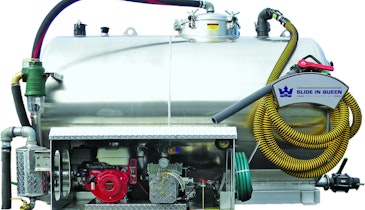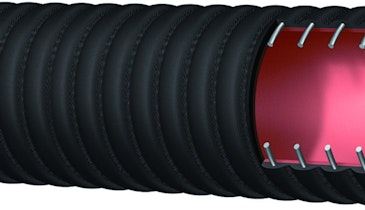Since 2003, septic pumper Jeff Rachlin has offered customers maintenance agreements to cover routine system care and warranties to cover systems over time.
Rachlin operates OnSite Management Inc. in West Chester, Pa. He and two business partners, Bud Baroni and Derald Hay, design, install, pump, monitor, maintain and service all types of septic systems. The company with nine employees covers four counties in southeastern Pennsylvania.
OnSite Management has developed a complete set of maintenance contracts for its septic business. The agreements are targeted to new customers upon OnSite’s installation of a system, but they’re also made available to owners of an existing septic system once OnSite conducts an inspection and assessment.
OnSite’s agreements are structured at three different levels based on what’s covered. They’re also priced based on whether the system is gravity-operated, a lift station, or a pressure-dosed system. Currently about 250 septic system owners have agreements — about 10 to 15 percent of OnSite’s total customer base.
Rachlin explains how OnSite’s Maintenance Agreements work to make life better both for the business and its customers.
Pumper: Why did you start offering maintenance contracts?
Rachlin: Once somebody’s under contract, my thinking was I would take them out of the marketplace. If you have peace of mind and your system’s being taken care of, you’re not opening up the Yellow Pages looking for a contractor unless we screw something up.
Pumper: Describe your three levels of contracts.
Rachlin: The lowest one is the Bronze Plan. That basically takes care of all the routine maintenance required of the system, including pumping when necessary. The Silver Plan takes care of all maintenance required for the systems, plus it warrants the tanks and the pumps. The Gold Plan covers maintenance, warranties for the tanks and pumps, and also a warranty for the absorption area.
We recognize that a lot of people just want to pay for maintenance. But we offer a full warranty option because some people want that peace of mind.
When we install a system, the customer is automatically put on the Gold Plan for the first 12 months, with the idea that they would continue in some capacity after that once they know how the contract works. What I try to get them to understand is it’s as close to flush and forget as you can get.
Pumper: Can a person with an existing septic system that you didn’t install get a maintenance agreement too?
Rachlin: Anybody can get a maintenance plan. For a warranty we would first do a full inspection with a hydraulic load test. You have to look at it from an actuarial standpoint. If you’ve got someone on a ventilator, you don’t want to give them life insurance. We try to manage our risk.
When someone calls us from the Yellow Pages and we pump their system, we leave them a brochure on how to take care of their system, some leak-detection dye tablets for their toilets, and information about the maintenance plan.
Pumper: If I’m a customer and I simply pay for three inspections a year as I go along, will it cost me more or less than if I buy the Bronze Plan, which covers those three inspections?
Rachlin: The Bronze Plan’s definitely cheaper. It’s something we can schedule.
Pumper: How does a maintenance visit help you keep tabs on a system’s condition?
Rachlin: When we do a maintenance visit, our technician will fill out a one-page form. We leave a carbon copy that lets the owner know we were there. If there was a problem they'll know exactly what we know. A copy of that maintenance checklist comes back to the office and we’ll go over them once a week. If there’s an issue we’re concerned about, we’ll either write the customer a letter or call them. Usually, if our technician comes across a problem and notes it on the form he leaves behind, the customer will call us.
Pumper: How did you set prices for the various levels of plans?
Rachlin: First we asked ourselves, what do you need to do for routine maintenance? Then we figured out what it costs per visit. Then we factor in profit and overhead costs.
For the warranty portions of the plans, there’s a vertical and horizontal analysis. The vertical analysis is: If I only have one under contract, over the lifetime of the system there’s enough to cover the cost of replacing it.
The horizontal analysis is: If a septic system lasts “X” number of years, you would need “X” number of contracts to cover the cost of it if it failed today.
The ultimate goal is to not have any replacement at all. The better job we do, the more likely that is. We haven’t had any catastrophic losses yet, but we’ve replaced some tanks.
We had to control for things that are not in our control. In a new car warranty, if you drive a car out of a showroom and you have an accident with it, the manufacturer isn’t going to stand behind it. Those are the types of things that are excluded. But for the most part our exclusions in terms and conditions don’t limit us from saying that if your system fails, we’ll be there.
Pumper: Do you have insurance against a catastrophic event related to this program?
Rachlin: No. We’re self-insuring it. We have enough under contract to manage the numbers. In the beginning it was a little risky, but we were warranting our own work.
Pumper: How did you first get the idea for the program?
Rachlin: It really came to me when somebody tried to sell me a maintenance package for my heating system. I didn’t buy it because I don’t believe in buying extended warranties.
Pumper: But a septic system requires ongoing maintenance. Is that the difference?
Rachlin: Yes. When you have an HVAC system, you don’t have a problem cleaning your own filter. But who wants to do that with your own septic system?
Pumper: How difficult was it to design contracts? Did you go through some trial and error?
Rachlin: It probably took about three months to develop. The trial and error was just to get information on a piece of paper.
One of the things that we didn’t expect was that we found some deficiencies in our own work — tanks cracking and things of that nature. It’s enlightened us to be better installers, higher quality installers.
Pumper: If you were starting from scratch now, would you do anything differently?
Rachlin: The changes occur as technology evolves. This plan doesn’t cover drip systems or peat filters. We’re actually doing that in some form now but it’s just not covered under the same program.
When we set up the septic systems, we try to make it so they’re easy to monitor and maintain. We want the main access on grade, we want monitoring ports in the absorption area.
Pumper: Why do customers buy these plans?
Rachlin: I think it’s a more heightened awareness. Septic system management is becoming a buzzword. The municipalities and our state are starting to push management.
Where we are in southeastern Pennsylvania, if someone is selling their house, there is an inspection done on the septic system. If it’s unsatisfactory, the buyer will go back to the seller and say, “I want a new system.” Then the buyer sees the seller not only shell out that money but he sees what the seller went through and doesn’t want that to happen to him. That’s the teaching moment.
I think that fear is a bigger motivator than whether you can afford it or not afford a maintenance plan. Customers realize this needs maintenance and it’s not a homeowner-friendly situation. As I said, no one wants to clean their own septic system.
Pumper: How do you respond to customers who just aren’t interested?
Rachlin: I tell them, “Pay me now or pay me later.” And I’ll tell somebody myself that if we see things getting out of whack, it’s easier to correct before it becomes a catastrophic overload.
CHECK IT OUT
For a look at the Onsite Management Inc. maintenance contract brochure, go to the Pumper® Web site at www.pumper.com/sampleforms.php and click on the appropriate link.





